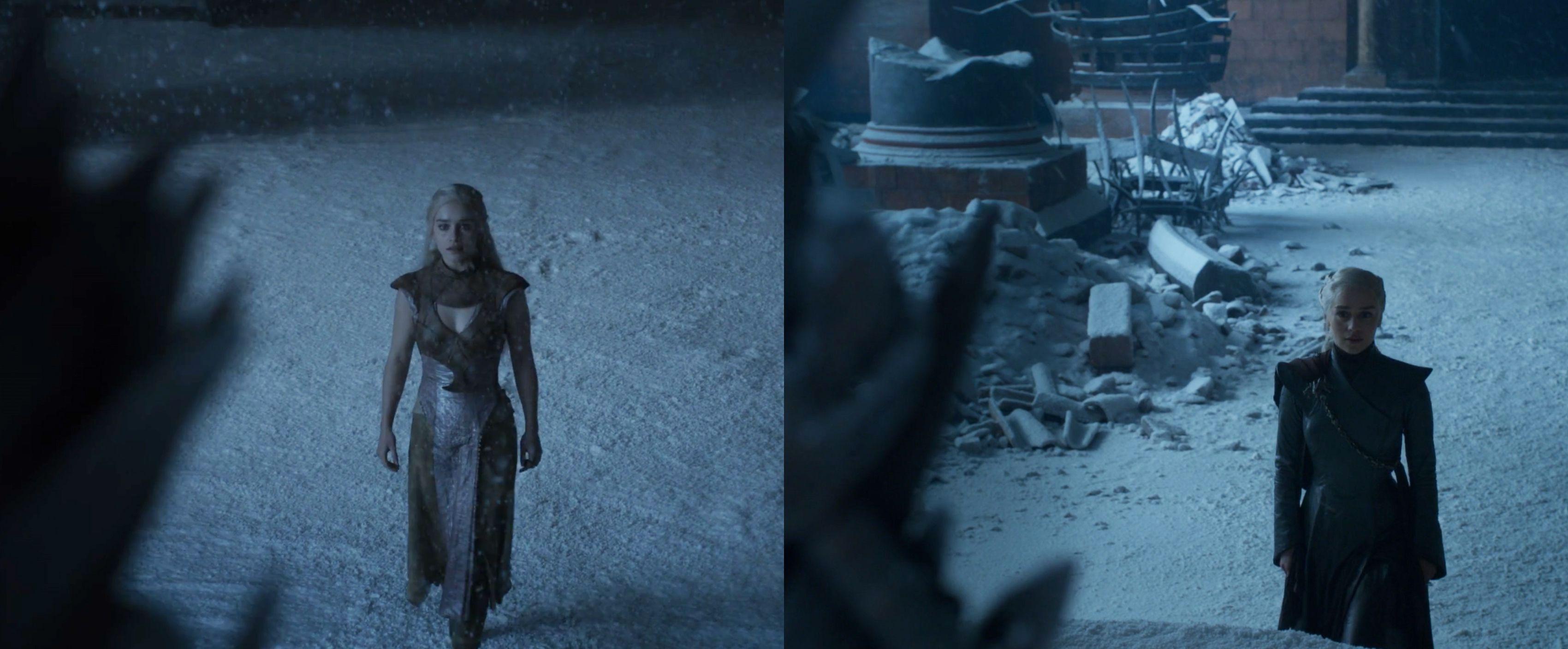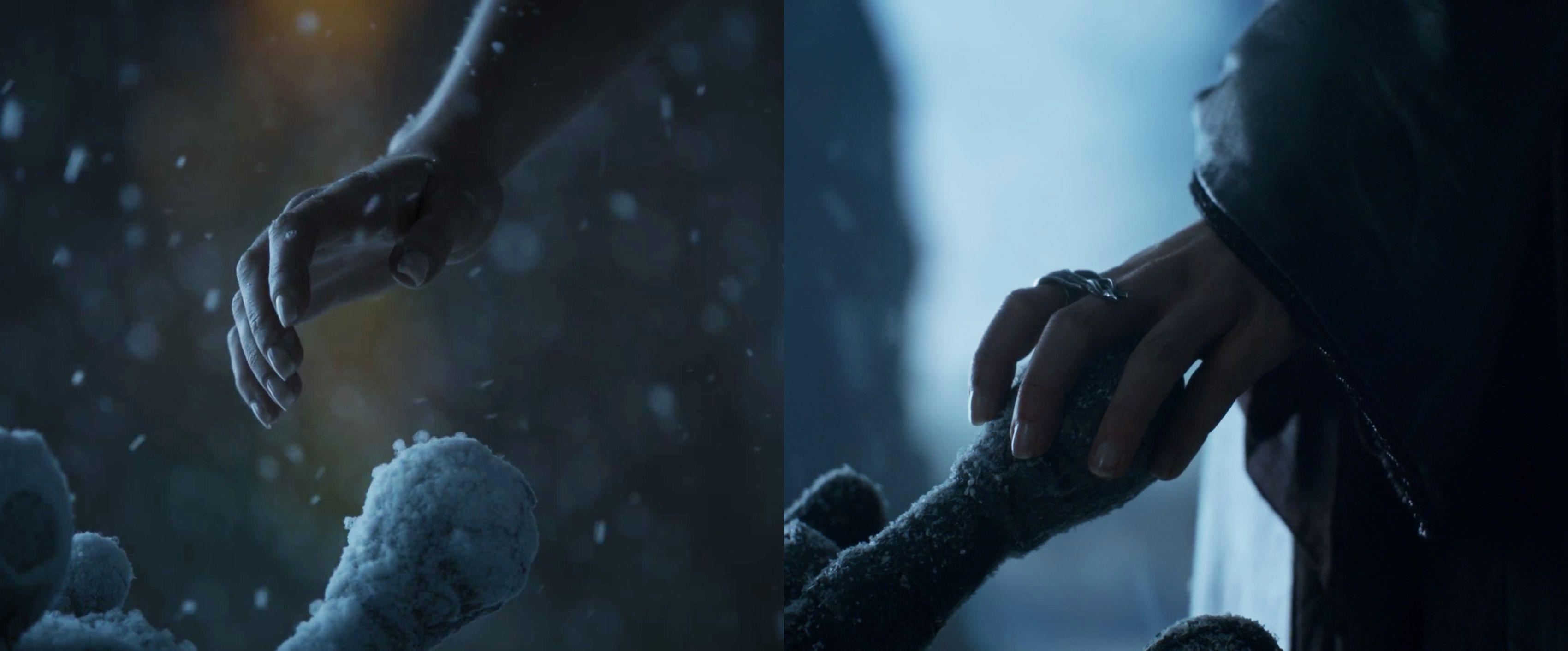Stannis Baratheon once said, “A good act does not wash out the bad, nor a bad the good.” The same is true of storytelling: A disappointing conclusion or sequel can’t retroactively ruin strong material, nor can satisfying conclusions erase previous flaws. The Godfather Part III doesn’t make the first two Godfather entries anything less than masterpieces, while conversely, no number of jokes in Avengers: Endgame can make Thor: The Dark World watchable. The same holds true for Game of Thrones. No matter what your feelings are toward the widely panned seventh and eighth seasons, the first six seasons of this saga will stand as incredible television; an unrivaled cultural phenomenon.
But new material can recontextualize prior work. When done correctly, subsequent storytelling can heighten previous scenes, adding drama, context, and satisfying foreshadowing. With that idea in mind, let’s look at some notable Thrones scenes—already great ones when they aired—that have depth added to them now that the series is at an end. (On Tuesday we explored the scenes that got worse.) These are the scenes that are even more powerful on a rewatch:
Daenerys Casts “Dracarys” and Frees the Unsullied (Season 3, Episode 4)
This may be the all-time Daenerys scene. It portrays nearly every aspect of her character: her desire to liberate slaves and make the world a better place; her stubborn nature, as she ignores her advisers and formulates her own plan; her cunning patience in fooling Kraznys mo Nakloz; her ironclad sense of justice; and, finally, her ruthlessness in doling out that justice.
Now that we know Daenerys’s ultimate destiny is as a war criminal and a tyrant, all her previous scenes of liberation become more complex, including this one. She drops “dracarys” to burn Kraznys and orders her Unsullied to kill the slave masters. It feels justified in the moment—these are villains she’s killing—but it portends the swiftness with which she would burn King’s Landing five seasons later and the righteousness with which she would defend her actions.
Additionally, “dracarys” is the last word spoken by Missandei before she was beheaded by the Mountain. In Season 7, Missandei spoke to Davos and Jon about how Daenerys was the queen she chose to follow; Dany freeing the Unsullied was likely the moment that truly solidified Missandei’s commitment. Her final words help this scene—and Daenerys’s entire history as a liberator—take on a deeper context. “Fire and Blood” are the words of House Targaryen, and Daenerys never shied away from displaying her ruthlessness. But for so long, that violence was aimed at the villains of the Thrones universe—not the innocent.
Aemon Tells Jon That Love Is the Death of Duty (Season 1, Episode 9)
Season 8 of Game of Thrones recycled dialogue with frustrating frequency. Tyrion repeated multiple jokes he’s made before; Melisandre brought back her Season 3 conversation with Arya and Syrio’s “What do we say to death?” quote; Arya told Sansa to “stick them with the pointy end”; and Varys repeated his “power resides where men believe it resides” quote. At times, it felt like the showrunners didn’t know what to write and just resorted to playing the hits from previous seasons.
But Jon bringing up Maester Aemon’s “love is the death of duty” speech is a callback I am happy to forgive. It’s the perfect thing for Jon to have on his mind as he ponders what to do when the woman he loves is at odds with the realm he once swore to serve. And when Tyrion flips the quote on its head moments later and tells Jon that “sometimes, duty is the death of love,” it’s even more perfect for the situation the two are facing.
In Season 1, Jon faces a similar dilemma. He’s just learned that Ned has been taken captive by the Lannisters, and he knows that his brother Robb will soon be marching to war. Jon wants to join Robb, yet he has already sworn his Night’s Watch vows, binding himself to stay out of the politics of the realm. “If the day should ever come when your lord father was forced to choose between honor on the one hand and those he loves on the other,” Maester Aemon asks Jon, “what would he do?”
“He would do whatever was right,” Jon responded. “No matter what.”
Jon sticks with the Night’s Watch, choosing duty over love. And in the series finale, he makes the same decision, killing Daenerys in order to be the shield that guards the realms of men once more. That this conversation happens with a Targaryen—Aemon is Daenerys’s great uncle and Jon’s great great uncle—adds even more layers to this scene.
Arya Says Goodbye to Gendry (Season 3, Episode 5)
By Season 8, Arya is an adult, a badass assassin who kills the Night King and saves Westeros. And by Season 8, it can be easy to forget how far she’s come. In Season 3, she was still a broken kid, traumatized from witnessing her father’s death and worried that she’d never see her family again.
“I can be your family,” she tells Gendry when he says that he is planning on staying with the Brotherhood Without Banners, her voice cracking as she pleads with him. But Gendry has already made up his mind. “You wouldn’t be my family,” he responds. “You’d be m’lady.”
This line takes on new depth with Arya and Gendry’s brief courtship in Season 8, and the dynamic between the two flips. When it’s Gendry asking Arya to be his family—to literally marry him—she of course rejects him, telling him that she’s not a lady. “That’s not me,” she says.
Every Gendry-Arya scene from seasons 2 and 3 is heightened by their reunion in Season 8. But this one is particularly poignant, as the search for family and belonging was so important for both characters. That they find each other in the end makes their earlier companionship all the sweeter.
Tyrion Asks Tywin for Casterly Rock (Season 3, Episode 1)
In the Season 3 premiere, Tyrion marches up the steps to visit his father Tywin, the hand of the king. Tyrion asks Tywin why he never came to visit him after he was wounded in the Battle of the Blackwater. He also makes an important request: to be named heir to Casterly Rock. The scene that follows is fantastic in any context, and it got more deep and interesting as Season 3 progressed. After the Red Wedding—Episode 9 of that season—it becomes clear that the letter Tywin is writing when Tyrion arrives is the beginning of his treacherous plot with the Freys to set the murderous events of the wedding into action. That makes everything that happens in this scene even more compelling: Tywin isn’t just delivering a masterful rebuke of his son, he’s also casually winning the War of the Five Kings from behind the walls of the Red Keep.
Now that the series is finished, the scene gets even more delicious. “I would let myself be consumed by maggots before mocking the family name and making you heir to Casterly Rock,” spits Tywin. Be careful what you wish for. Tyrion not only kills Tywin at the end of Season 4, but ends the series as the only living Lannister, the hand of King Bran, and the presumed Lord of Casterly Rock and Warden of the West. Take that, Tywin.
Daenerys’s Vision at the House of the Undying (Season 2, Episode 10)
When Daenerys finally reaches the throne room in the series finale, the parallels to her Season 2 vision are not subtle:

But whereas she doesn’t touch the throne in Season 2, she does in Season 8:

The destruction of the room itself is the most obvious foreshadowing, as it mirrors what she finds in Season 8 almost exactly. But the parallels go deeper. In Season 2, the cries of Daenerys’s dragons bring her away from the throne, through the Castle Black gate, and to a vision of the departed Khal Drogo, who is waiting for her in a tent with Rhaego, the baby she was never able to have. In Season 8, it’s a different dragon—Jon Snow—that turns her attention from the throne, but the result is the same: Daenerys dies, immediately going to the place where her husband and unborn child are waiting for her once again.
There’s an Easter egg in this scene as well. When she emerges from the vision in Season 2, the warlock Pyat Pree says that Daenerys will be with her dragons “through winter, summer, and winter again,” paralleling a lyric from the “Jenny of Oldstones” song Podrick sings in Episode 2 of Season 8 (though from the second verse, which Pod didn’t get to in the episode). This Season 2 vision deviated heavily from the one Dany has in the books, but Season 8 shows the careful planning that was behind it.
Jon and Ygritte in the Cave (Season 3, Episode 5)
The Jon-Ygritte romance is brimming with chemistry, especially in contrast with the relatively flat relationship between Jon and Daenerys. The Season 8 waterfall scene in which Daenerys tells Jon that they “could stay a thousand years” was a clear callback to this scene with Ygritte, but that scene could never have been as powerful as this moment with Ygritte.
“I don’t ever want to leave this cave, Jon Snow,” Ygritte says. “Not ever.”
Of course they did leave the cave, and Ygritte died in Season 4, while Jon went on to unite Daenerys and the North against the Night King before saving the realm from Dany. But it’s difficult to think of a time when Jon was truly this happy again, before his struggle with the Night King dominated his life and he became a full-time brooder.
Thrones ends with Jon walking out into the wilderness beyond the wall with the wildlings, cementing that the far north is where he always belonged. I wonder if he was thinking about Ygritte as he headed north, too. Maybe he and Ygritte really should have stayed in that cave.
King Robert Arrives at Winterfell (Season 1, Episode 1)
Robert’s arrival in Winterfell to ask Ned to be his new hand set up all of Thrones, and the way that Episode 1 of Season 8—when Daenerys and Jon arrive at the ancestral Stark home—paralleled Robert’s arrival just makes this scene sing all the more. And with the series at an end, this scene shines as an example of how far this show came over 73 episodes.
Bran is climbing over Winterfell’s battlements (and Robert thinks he’ll be a soldier!). Arya is beaming through a soldier’s helmet, taking a long look at the Hound. Sansa is rolling her eyes at her sister. Robb tries his best to look like a lord. Jon stands in the back. Catelyn is trying to wrestle control of her kids. Jaime is still the Golden Lion. Cersei is annoyed at her husband. Joffrey has a smirk on his face. And Ned and Robert put a long-dormant friendship on display for everyone (“You’ve gotten fat!”). The only person missing is Tyrion—in typical early-season fashion, he’s at a brothel.
Knowing everything the Stark family goes through in this saga—and how much they’d have to sacrifice to reclaim their family home—makes these first few scenes in Winterfell precious. They’re just about the only time that the world of Westeros still feels like it has some innocence to it. That’s special, and the scene’s impact is stronger knowing the paths of every character.
Disclosure: HBO is an initial investor in The Ringer.
